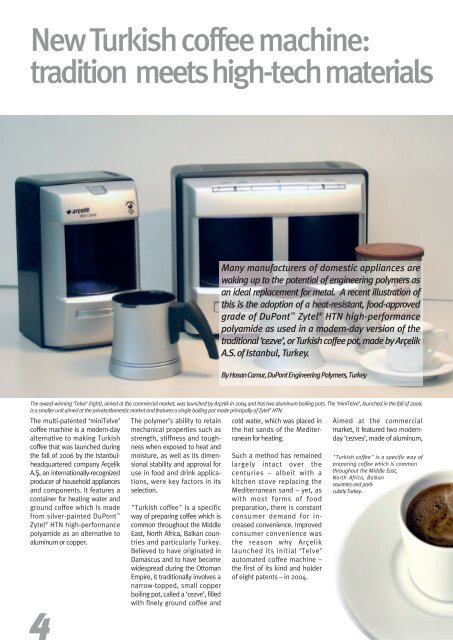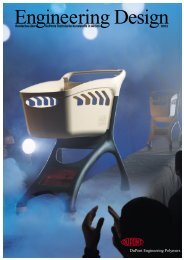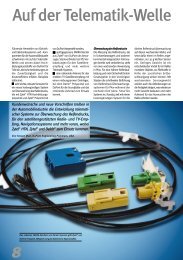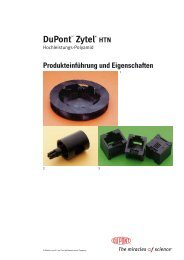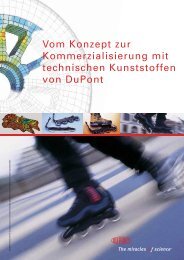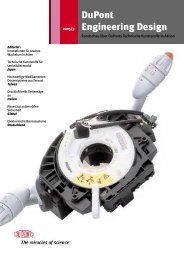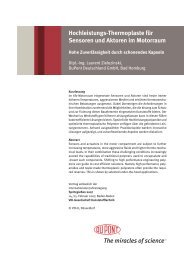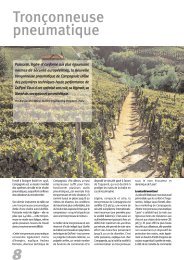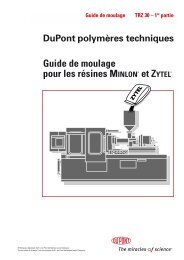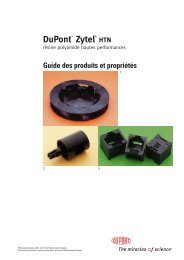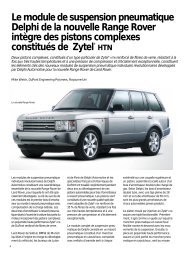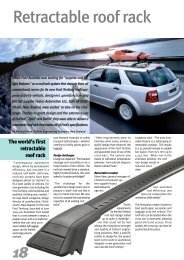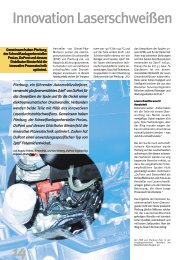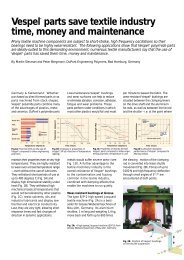New Turkish coffee Machine - Plastics, Polymers, and Resins - DuPont
New Turkish coffee Machine - Plastics, Polymers, and Resins - DuPont
New Turkish coffee Machine - Plastics, Polymers, and Resins - DuPont
Create successful ePaper yourself
Turn your PDF publications into a flip-book with our unique Google optimized e-Paper software.
<strong>New</strong> <strong>Turkish</strong> <strong>coffee</strong> machine:<br />
tradition meets high-tech materials<br />
The award-winning ‘Telve’ (right), aimed at the commercial market, was launched by Arçelik in 2004 <strong>and</strong> has two aluminum boiling pots. The ‘miniTelve’, launched in the fall of 2006,<br />
is a smaller unit aimed at the private/domestic market <strong>and</strong> features a single boiling pot made principally of Zytel ® HTN.<br />
The multi-patented ‘miniTelve’<br />
<strong>coffee</strong> machine is a modern-day<br />
alternative to making <strong>Turkish</strong><br />
<strong>coffee</strong> that was launched during<br />
the fall of 2006 by the Istanbulheadquartered<br />
company Arçelik<br />
,<br />
A.S, an internationally-recognized<br />
producer of household appliances<br />
<strong>and</strong> components. It features a<br />
container for heating water <strong>and</strong><br />
ground <strong>coffee</strong> which is made<br />
from silver-painted <strong>DuPont</strong> <br />
Zytel ® HTN high-performance<br />
polyamide as an alternative to<br />
aluminum or copper.<br />
4<br />
The polymer’s ability to retain<br />
mechanical properties such as<br />
strength, stiffness <strong>and</strong> toughness<br />
when exposed to heat <strong>and</strong><br />
moisture, as well as its dimensional<br />
stability <strong>and</strong> approval for<br />
use in food <strong>and</strong> drink applications,<br />
were key factors in its<br />
selection.<br />
"<strong>Turkish</strong> <strong>coffee</strong>" is a specific<br />
way of preparing <strong>coffee</strong> which is<br />
common throughout the Middle<br />
East, North Africa, Balkan countries<br />
<strong>and</strong> particularly Turkey.<br />
Believed to have originated in<br />
Damascus <strong>and</strong> to have become<br />
widespread during the Ottoman<br />
Empire, it traditionally involves a<br />
narrow-topped, small copper<br />
boiling pot, called a ‘cezve’, filled<br />
with finely ground <strong>coffee</strong> <strong>and</strong><br />
Many manufacturers of domestic appliances are<br />
waking up to the potential of engineering polymers as<br />
an ideal replacement for metal. A recent illustration of<br />
this is the adoption of a heat-resistant, food-approved<br />
grade of <strong>DuPont</strong> Zytel ® HTN high-performance<br />
polyamide as used in a modern-day version of the<br />
traditional ‘cezve’, or <strong>Turkish</strong> <strong>coffee</strong> pot, made by Arçelik<br />
A.S. of Istanbul, Turkey.<br />
By Hasan Camur, <strong>DuPont</strong> Engineering <strong>Polymers</strong>, Turkey<br />
cold water, which was placed in<br />
the hot s<strong>and</strong>s of the Mediterranean<br />
for heating.<br />
Such a method has remained<br />
largely intact over the<br />
centuries – albeit with a<br />
kitchen stove replacing the<br />
Mediterranean s<strong>and</strong> – yet, as<br />
with most forms of food<br />
preparation, there is constant<br />
consumer dem<strong>and</strong> for increased<br />
convenience. Improved<br />
consumer convenience was<br />
the reason why Arçelik<br />
launched its initial ‘Telve’<br />
automated <strong>coffee</strong> machine –<br />
the first of its kind <strong>and</strong> holder<br />
of eight patents – in 2004.<br />
Aimed at the commercial<br />
market, it featured two modernday<br />
‘cezves’, made of aluminum,<br />
"<strong>Turkish</strong> <strong>coffee</strong>" is a specific way of<br />
preparing <strong>coffee</strong> which is common<br />
throughout the Middle East,<br />
North Africa, Balkan<br />
countries <strong>and</strong> particularly<br />
Turkey.
that would prepare the <strong>coffee</strong><br />
whilst the user could turn his attention<br />
to other matters without the<br />
risk of the <strong>coffee</strong> boiling over. Its<br />
concept <strong>and</strong> design was a recipient<br />
of an IF Product Design Award<br />
at the International Forum Design<br />
show in Hanover, Germany in 1995.<br />
At the start of 2005 Arçelik looked<br />
to produce a smaller, costeffective<br />
unit – the ‘miniTelve’ for<br />
the private/domestic market,<br />
which would feature a<br />
single boiling pot.<br />
"The production of<br />
the aluminum-forged<br />
‘cezve’ proved to be<br />
too costly for our purposes,<br />
so we broadened<br />
our search for polymer<br />
alternatives," comments<br />
Levent Reisoglu,<br />
project leader for both<br />
the ‘miniTelve’ <strong>and</strong> the<br />
‘Telve’. A long-st<strong>and</strong>ing<br />
relationship with<br />
<strong>DuPont</strong>, resulting in<br />
the use of a number<br />
of the company’s<br />
high-performance<br />
polymers as a replacement<br />
for metal<br />
in a range of Arçelik<br />
products over the last<br />
ten years led to the trial of a<br />
food-approved grade of Zytel ®<br />
˜<br />
HTN on a prototype tool.<br />
<strong>DuPont</strong>’s high-performance<br />
polyamide was subsequently<br />
adopted for<br />
The award-winning ‘Telve’ (right), aimed<br />
at the commercial market, was launched<br />
by Arçelik in 2004 <strong>and</strong> has two aluminum<br />
boiling pots. The ‘miniTelve’, launched in<br />
the fall of 2006, is a smaller unit aimed at<br />
the private/domestic market <strong>and</strong> features<br />
a single boiling pot made principally of<br />
Zytel ® HTN.<br />
the injection-molded body of the<br />
boiling pot, fixed to an aluminum<br />
base by a ring, also made of<br />
Zytel ® HTN, <strong>and</strong> sealed with a<br />
heat- <strong>and</strong> moisture-resistant<br />
rubber. A two-part PBT h<strong>and</strong>le is<br />
mounted to the body of the pot<br />
with a screw. Indeed the<br />
production process for the new<br />
Zytel ® HTN pot consisted of only<br />
ten stages, compared to the 17<br />
stages required for the aluminum<br />
pot.<br />
Painted (above)<br />
<strong>and</strong> unpainted<br />
Zytel ® HTN<br />
In its external dimensions,<br />
the new<br />
boiling pot made of<br />
Zytel ® HTN is identical to its<br />
aluminum predecessor – they<br />
both are 90 mm (3.5 in) tall with<br />
a maximum diameter of 90 mm<br />
(3.5 in) – yet its capacity is larger<br />
(200 ml (6.8 fluid ounces) versus<br />
130 ml (4.4 fluid ounces)),<br />
thus enabling the pot to be<br />
used for the preparation of<br />
three cups of <strong>coffee</strong> rather<br />
than two. This is largely due<br />
to the polymer’s greater geometrical<br />
<strong>and</strong> production flexi-<br />
bility versus aluminum, enabling<br />
designers at Arçelik to<br />
make the most effective use of<br />
the inside volume of the pot.<br />
The new design carries seven<br />
patent applications, three of<br />
which are related to the<br />
polymer boiling pot.<br />
"With the benefit of<br />
material selection,<br />
design <strong>and</strong> processing<br />
support provided<br />
by <strong>DuPont</strong>,<br />
as well as our<br />
own use of computer-aided<br />
engineering<br />
tools such<br />
as moldflow<br />
<strong>and</strong><br />
warpage<br />
analysis,<br />
we were<br />
able to produce<br />
a boiling pot<br />
made principally<br />
from Zytel ® HTN. It<br />
withst<strong>and</strong>s repeated<br />
exposure to the<br />
heating process<br />
used in the <strong>coffee</strong><br />
machine, involving<br />
temperatures of up<br />
to 150 degrees C<br />
(300 degrees F) for one to three<br />
minutes during each cycle<br />
depending on the amount of<br />
<strong>coffee</strong> being made, as well as<br />
recurring exposure to the boiling<br />
water it contains. Moreover, the<br />
pot was more durable than<br />
aluminum to the repeated<br />
knocks of daily use, meaning it<br />
retains its form over time <strong>and</strong><br />
continues to fit smoothly into the<br />
machine," explains Reisoglu. ˜<br />
A silver-like finish was achieved<br />
by applying one coat of a foodapproved,<br />
heat-resistant paint to<br />
the Zytel ® HTN. <strong>DuPont</strong> also<br />
provided advice on paint<br />
selection.<br />
This development has served to<br />
raise awareness within Arçelik<br />
for the potential of engineering<br />
polymers from <strong>DuPont</strong>: "The<br />
‘miniTelve’ is a high-profile<br />
project at Arçelik, <strong>and</strong> many of<br />
our engineers have been made<br />
aware of the heat-resistant<br />
performance of Zytel ® HTN<br />
thanks to the success of our<br />
latest model," concludes<br />
Reisoglu. ˜<br />
Levent H. Reisoglu ˜<br />
R & D Department<br />
Arçelik A.S. ,<br />
Casamir Makinasi Isletmesi<br />
34950, Tuzla, Istanbul<br />
Turkey<br />
Tel: +90 216 585 8431<br />
Fax: +90 216 423 3045<br />
e-mail: levent.reisoglu@arcelik.com<br />
www.arcelik.com<br />
5


